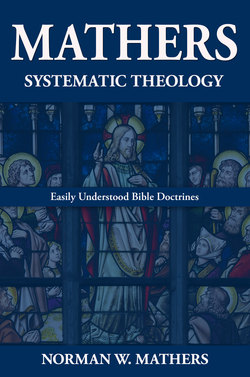Читать книгу Mathers Systematic Theology - Norman W. Mathers - Страница 15
2.2 Inspiration extends to all parts, words, and letters of Scripture. 2.2.1 The Bible claims to be inspired in its entirety.
ОглавлениеThe Bible testifies to the fact that all scripture is God-breathed (2 Tim. 3:16-17). Scripture originated with God, the Holy Spirit (2 Pet. 1:20-21). There is a dual authorship behind the scriptures. Inspiration extends to both the Old and the New Testaments (1 Tim. 5:18). The apostle Paul quotes from Deuteronomy (25:4) and also from the gospel of Luke (10:7) calling both scripture. The inspiration of the Word of God extends to the very choice of words of scripture (1 Cor. 2:13). Jesus taught that the inspiration extends to the letters of scripture (Matt. 5:18). The Bible is completely reliable (2 Pet. 1:16-18) and trustworthy (1:19). The Scriptures cannot be broken (John 10:35). “The Scripture is not able to have been loosed” [author’s translation] (John 10:35) (Aland & Black 1966:369). The verb luo to loose has the idea of to be abolished or to do away with (Arndt & Gingrich 1973:485.4). The Bible teaches the verbal plenary inspiration of the scriptures. Verbal inspiration means that the words are inspired. Plenary inspiration means that inspiration extends to all scripture. The scriptures come from God. The same perfections of the character of God are extended to the Word of God (Walvoord 1974:22). The Holy Spirit moved on holy men of God to write the scriptures (2 Pet. 1:20-21). It is begging the question to assume that this extends to the oral prophecies as well beyond what is written. This is an irrelevant question. Oral prophecies are recorded in the Word of God as well. An example of this is the prophecy of Caiaphas who spoke from God. This is recorded in the gospel of John 11:51. The Thessalonians received the apostolic preaching not as the words of men but the Word of God. “And for this very reason also we give thanks to God unceasingly, because having received word of preaching” (akoes-oral message) “from us of God you yourselves have received” (welcomed 1st Aorist middle, 2nd person plural – Han 1974:374) “not word of men” (plural) “but just as it is truly Word of God, which also supernaturally energizes in you those believing” (present active participle, dative,plural, masculine-ibid:374) [author’s translation] (1 Thess. 2:13) (Aland & Black 1968:706). Word is in the accusative case. Akoes is a genitive of apposition. Word names a broad or general category. “Akoes” as a genitive of apposition names a specific category within that broad or general category. “Of God” is a genitive but a genitive of simple apposition. It agrees in number and case to the word to which it is related in the sentence (Williams 1971:5:12). In this case, it is in simple apposition to “akoes.” “Of God” is related to “akoes.” The oral message their preaching was the Word of God. The Thessalonians received the apostolic preaching as the Word of God. It was not “word of men” but “just as it is truly Word of God.” “Kathos” is a subordinate conjunction that introduces a comparative clause. The preaching of the apostles is compared to the Word of God. This is true as indicated by “alethos” because their message was the Word of God. Another comparison could be observed in the context the comparison of the word of men (plural) to the Word of God. The apostle’s preaching was not a humanistic message but the very Word of God. The infallibility of the Word of God is related to inspiration. The Holy Spirit, the third member of the triune God, cannot lie.
